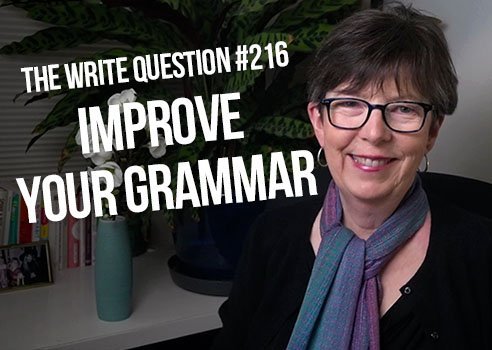Viewing time: 4 mins 1 sec
The Write Question is a weekly video podcast all about writing. Today’s question? How to improve your grammar? If you have a question you’d like me to answer you can email me, tweet me @pubcoach, or leave a message for me at the Skype account, The Write Question.
Transcript:
How can you improve your grammar? That’s the topic I’m addressing today in The Write Question. I’m Daphne Gray-Grant, the Publication Coach.
I have a question from Umida Aimbetova, a writer based in Nukus, Uzbekistan. Here’s what she’s asked by email…
“I’m about to study abroad, but first of all, I have to get a special certificate. After I attended an IELTS course, my tutor said that my English grammar is low, which is why I’m making so many writing mistakes right now. What do you suggest that I do?”
Thanks for your question, Umida. I’m tempted to say that your tutor should be the person giving you this advice! After all, you’re paying this person, and teaching the English language is one of their areas of expertise.
But just in case your teacher isn’t very helpful, let me make a few suggestions .
English is an extremely difficult language to learn. While there are rules — dozens of them — there are also a great many exceptions, which you have to memorize. As well, English has a lot of homophones — words that sound the same but have different meanings. English spelling is notoriously difficult and often not the least bit phonetic.
I’m not an English teacher myself, so I have no special tips for how to improve your grammar. But I can give you five general suggestions.
First, read a lot. Find a genre that you particularly like — nothing boring or dutiful! — and read every day. I suggest you spend at least 30 minutes a day reading in English.
Second, find a good grammar book. I particularly like The Transitive Vampire, by Karen Gorden. It’s short — just 144 pages — very clear and very funny. I include a link to it in the show notes.
Third, find a good grammar workbook and spend at least 15 minutes on it every day. Ask your tutor to suggest a title, and if they can’t, take a look at the book ESL Grammar by Mary Ellen Muñoz. See link in the show-notes below.
Fourth, find someone who speaks your native language AND English and ask them to guide you on the most confusing points of English grammar. There will be common, predictable challenges, and if you can prepare for them, you’ll be better off.
Fifth, get extra help from some writing software. While real live people can help you a lot, sometimes it just gets embarrassing to have to keep asking basic grammar questions. Here is where software can save you. You may have heard of Grammarly, but I like the software ProWritingAid even better. See the show-notes for a link to a post I’ve written on the two pieces of software.
Finally, let me wrap up with the words of the French writer, historian and philosopher François-Marie Arouet, more commonly known as Voltaire: “Language is a very difficult thing to put into words.”
Umida, I know it is so challenging to learn another language. I’m continuing to struggle to improve my fluency in French. But if your goal is to work and study abroad, being fluent in English will be hugely beneficial to you. Use that as your motivation.
*
Viewers, if you have any writing-related questions, I’d be happy to do a video on them. Just send me a quick email, daphne@publicationcoach.com, or put a note in the comments section of this video.
And, if you’d like to learn more about how to make writing a happier and more rewarding process, check out my latest book Your Happy First Draft. I don’t sell it in bookstores or via Amazon. The only place to buy it is on my website, link below and in the show notes.
Links
Is it worth paying for ProWritingAid (And is it better than Grammarly?)


